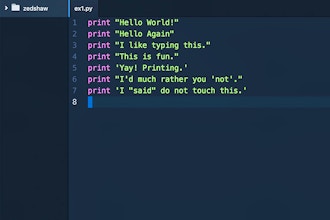Discover the Best Live Online Web Development Classes
Web development refers to the processes used to create and maintain websites or web applications. It encompasses a wide range of tasks, from creating simple static pages using HTML and CSS, to developing complex web-based applications, social networking sites, and e-commerce platforms using various programming languages and technologies.
Learning web development can lead to many opportunities. Web development is a high-demand skill that can open doors to significant job prospects in a wide variety of industries. Such jobs can also offer a great deal of flexibility if you work remotely full-time. Web development can also help you run your own business. You can work as a freelance Web Developer or use your web development skills to enhance websites and web applications that further your business. If you enjoy learning new things, web development offers the chance to enter a constantly-evolving field. Regardless of your background or previous experience, web development is a versatile and rewarding field to explore.
Best Live Online Web Development Classes & Schools
Online web development classes and schools provide the opportunity to learn from experts no matter where they, or you, are located. This section offers details about some of the best live online web development classes and schools offering beginner-friendly courses and programs.
Regardless of which aspect of web development you intend to focus on long term, learning HTML and CSS is essential for any aspiring Web Developer. HTML and CSS not only allow you to code web pages from scratch or to customize existing pages and sites. These programming languages are also very beginner-friendly and serve to introduce you to the world of coding. Learning HTML and CSS can therefore make learning another web development language, such as JavaScript or Python, easier down the road. NYC Career Centers offers a Web Development with HTML and CSS class that teaches students to develop web pages and websites using HTML and CSS. This course is taught by an expert instructor in real-time and includes hands-on assignments.
A stand-alone course can be a great way to test your interest in web development. Once you decide what area of web development interests you most, you may wish to enroll in a certificate course. Front-end Web Development focuses on the user-facing elements of a website, meaning the elements that site visitors see, rather than the server-side components. Noble Desktop’s Front-End Web Development Certificate program teaches you how to build websites using HTML, CSS, JavaScript, and WordPress. The program welcomes students with no prior web development experience and provides a curriculum that prepares you for a career as a Front-end Web Developer.
If you are interested in becoming a JavaScript Developer, then you may be interested in Practical Programming’s JavaScript Programming Bootcamp. This bootcamp teaches JavaScript programming essentials so that you can program web applications. The curriculum covers variables, data types, functions, and more.
If you are interested in Python programming, cPrime’s Introduction to Python class provides a foundational understanding of the programming language and its many capabilities.
Industries That Use Web Development
Since web development is used to create websites, you can apply web development skills to nearly any industry. Websites are used by businesses of all sizes, from small businesses to international corporations. They are also used by nonprofits, government, and schools. This section will explore how web development is used in healthcare, retail, education, finance, government, travel, and entertainment.
With the rise of telemedicine and the increasing use of digital records, hospitals and medical centers rely on web development to provide patient services and to protect patient information. Web Developers working in healthcare create and manage secure platforms that allow patients to make appointments, contact doctors, access medical records, and participate in online consultations. Web development is also used to manage and protect hospital and medical center data. For example, a hospital may track the number of patients with a particular illness in order to divide resources appropriately and even to help track community spread.
The retail industry uses web development for websites that allow for online shopping and also use web development to promote their physical stores. E-commerce uses web development for transactions that take place entirely online. Major retail stores often use web development for dual purposes by providing online shopping, but also promoting in-store events such as sales. For example, a customer may browse a website looking for a particular piece of clothing. Upon finding it, they can order it online and track the shipment from the website, or they may wish to check if the item is in-stock at a nearby physical store. Web Developers interested in the retail industry should understand how to create a good User Experience (UX) and User Interface (UI) to keep customers coming back. You will also need to understand how to keep customer data, such as payment information, secure.
The education industry uses web development to manage university websites, educational resources, and online learning platforms. Web Developers working in education should consider the age of users. For example, a platform intended for elementary students will differ from one catering to adult learners. Web Developers will also need to consider the needs of teachers, parents, and others requiring access to the website.
In Finance, web development enables the use of financial planning tools, power trading platforms, online banking, and more. When handling financial information, security is essential. Web Developers must balance security needs with ease of use so that users can take the appropriate actions on the website or web application.
Governments use web development to provide public information and to facilitate some public services. For example, a government website might list when the next public meeting for a city’s planning department will be held. This same website might allow for locals to pay their utility bills online.
The travel industry, including hospitality, uses web development to allow users to browse and book hotels, access travel guides, book airline tickets, reserve rental cars, leave reviews, book a tour, and more. Hotels and travel companies also use web development to manage their websites and web applications.
Web development is also used in the entertainment industry. Streaming services, news platforms, social media, and gaming platforms all use web development to deliver content to users. These platforms often support large volumes of data for large volumes of users, meaning Web Developers in the entertainment and media business must know how to create and maintain complex digital platforms that support these functions.
Web Development Jobs & Salaries
If you are interested in making web development your career, you might wonder what current and future job prospects look like. The Bureau of Labor Statistics projects that web developer jobs will grow by 30% between 2021 and 2031. The exact responsibilities of a web development job depend on the level of experience that the job requires, the industry you are working in, and the type of organization you work for. Generally, however, Web Developers create and manage websites and web applications. Related job titles include Full Stack Developer, Front End Developer, Back End Developer, JavaScript Developer, and WordPress Developer.
There are two sides of a website or web application a developer may work on: the front-end (user-facing) and the back-end (server-side). A Full Stack Developer works on both the front and back ends while a Front End Developer focuses solely on the user-facing components and a Back End Developer focuses solely on the server-side components. Front End Developers often use HTML, CSS, and JavaScript, as well as frameworks like Vue.js and React. Back End Developers use programming languages such as Ruby, Java, or Python, and databases like MySQL and MongoDB. Full Stack Developers have the knowledge to work across all parts of the website or web application, and must therefore be well versed in front and back end languages and tools.
A JavaScript Developer specializes in using the JavaScript programming language to create and manage web applications. JavaScript Developers might work as Full Stack Developers, Front End Developers, or Back End Developers depending on the job. Common JavaScript frameworks and libraries these developers use include Vue.js, React, and Angular.
WordPress Developers are Web Developers that specialize in building WordPress sites. They may work for a marketing agency, building websites for clients, or may work freelance, finding their own clients. An estimated 40% of all websites are built using WordPress. These websites can be customized to fit a variety of needs, making them a great option for businesses small and large.
How much a Web Developer earns depends largely on experience and location. According to BLS, the median wage for Web Developers is $80,000 per year. This means that $80,000 is the middle figure on the scale of what Web Developers earn, with new Web Developers typically on the lower end of the scale and more senior developers on the upper end.
Salaries also depend largely on location, and how far that salary stretches depends on the cost of living for that area. Indeed.com found the average salary for a Web Developer in Los Angeles is around $90,000 per year. Indeed also found that a Web Developer in New York City will make, on average, $95,000 annually. Both of these average salaries are fairly high, which reflects location in a major metropolitan area and the cost of living that accompanies that.



























